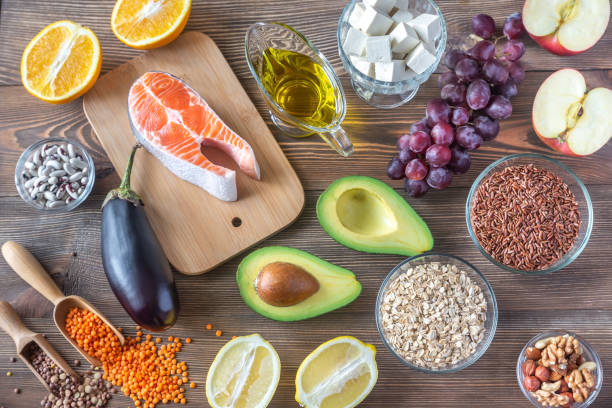What Is a Low Cholesterol Diet?
A low cholesterol diet is an eating plan designed to lower blood cholesterol levels, particularly LDL (low-density lipoprotein), often referred to as “bad” cholesterol. High levels of LDL cholesterol are a major risk factor for heart disease, stroke, and atherosclerosis—the buildup of plaque in the arteries.
This diet emphasizes nutrient-dense, high-fiber, plant-based foods while limiting saturated fats, trans fats, and dietary cholesterol. Though not a quick fix, a low cholesterol diet can significantly improve cardiovascular health and reduce dependence on medication over time.
How Cholesterol Affects the Body:
Cholesterol is a waxy substance made by the liver and obtained from some foods. It’s vital for hormone production and cell health—but too much LDL can lead to plaque buildup in arteries, restricting blood flow and increasing the risk of heart attacks and strokes.
- LDL (Bad Cholesterol): Increases risk of heart disease.
- HDL (Good Cholesterol): Helps remove LDL from the bloodstream.
- Triglycerides: A type of fat in the blood that also affects heart risk.
Key Principles of a Low Cholesterol Diet:
Eat More of These:
| Food Group | Examples | Benefits |
|---|---|---|
| Fruits and Vegetables | Berries, spinach, kale, apples | High in fiber and antioxidants |
| Whole Grains | Oats, brown rice, quinoa | Soluble fiber helps lower LDL |
| Legumes | Lentils, beans, chickpeas | Rich in fiber and plant protein |
| Nuts and Seeds | Almonds, walnuts, flaxseeds | Contain healthy fats and plant sterols |
| Fatty Fish | Salmon, mackerel, sardines | Omega-3s lower triglycerides |
| Plant-Based Oils | Olive oil, avocado oil | Heart-healthy monounsaturated fats |
Limit or Avoid These:
| Food Group | Examples | Why Avoid |
|---|---|---|
| Saturated Fats | Butter, fatty red meat, full-fat dairy | Raises LDL cholesterol |
| Trans Fats | Packaged snacks, fried foods | Increases LDL, decreases HDL |
| Cholesterol-Rich Foods | Organ meats, shellfish, egg yolks (in moderation) | Contribute to blood cholesterol in some people |
| Processed Meats | Sausages, bacon, deli meats | High in saturated fat and sodium |
| Refined Carbs & Sugars | White bread, pastries, soda | Increase triglycerides and promote weight gain |
Sample One-Day Low Cholesterol Meal Plan:
| Meal | Foods |
|---|---|
| Breakfast | Oatmeal topped with sliced banana and chia seeds; green tea |
| Snack | Apple slices with almond butter |
| Lunch | Lentil and vegetable soup; whole grain toast with hummus |
| Snack | Handful of walnuts and a small orange |
| Dinner | Grilled salmon with quinoa and steamed broccoli |
| Dessert | Fresh berries with a spoonful of low-fat Greek yogurt |
Benefits of a Low Cholesterol Diet:
Improved Heart Health:
Lowering LDL reduces the risk of heart attacks, strokes, and artery blockages.
Weight Management:
High-fiber, low-fat foods promote satiety, aiding weight loss or maintenance.
Better Blood Sugar Control:
Low cholesterol diets that limit refined carbs also improve insulin sensitivity.
Reduced Inflammation:
Plant-based, antioxidant-rich foods help reduce chronic inflammation, another heart disease risk.
Long-Term Disease Prevention:
Lowers risk of type 2 diabetes, hypertension, and metabolic syndrome.
Tips to Start a Low Cholesterol Diet:
- Read Nutrition Labels – Avoid trans fats and monitor saturated fat content.
- Cook at Home – Control ingredients and portion sizes.
- Choose Healthy Snacks – Replace chips with nuts or fresh fruit.
- Go Plant-Based Often – Try meatless meals 2–3 times per week.
- Swap Ingredients – Use avocado instead of mayo, olive oil instead of butter.
- Exercise Regularly – Physical activity helps raise HDL and lower LDL.
Who Should Follow a Low Cholesterol Diet?
This diet is ideal for individuals who:
- Have high total or LDL cholesterol
- Have a family history of heart disease
- Are overweight or have type 2 diabetes
- Want to prevent cardiovascular disease
- Are already on cholesterol-lowering medication and want better results
Final Thoughts:
A low cholesterol diet is a safe, sustainable, and effective way to improve heart health and reduce disease risk. By focusing on whole, plant-based foods, healthy fats, and fiber-rich choices, you can take control of your cholesterol levels naturally.
Combined with lifestyle changes like regular exercise, stress management, and quitting smoking, a low cholesterol diet is a powerful tool for long-term health and vitality.
